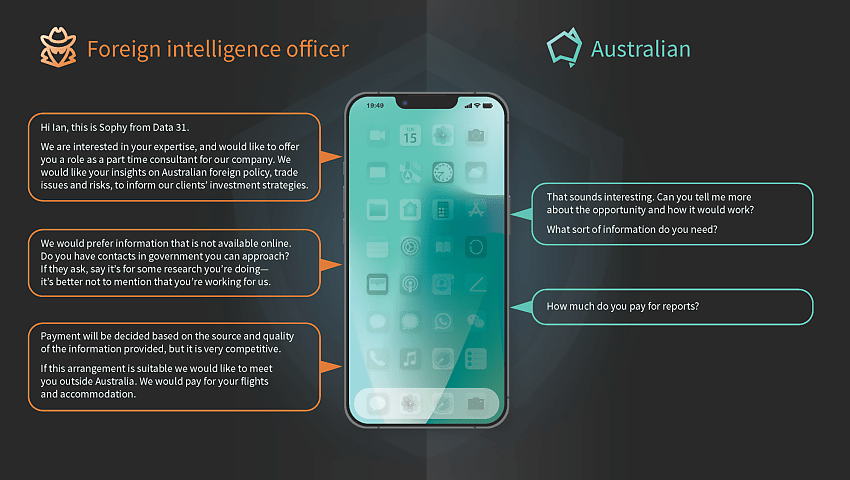The Australian Security Intelligence Organisation’s Director-General of security, Mike Burgess, has warned individuals with privileged information to be on guard, after a former Australian politician was recruited by a foreign intelligence service.
The Director-General’s warning follows reports from the Australian Security Intelligence Organisation’s (ASIO) Annual Threat Assessment 2024 report that a former Australian politician “sold out their country, party and former colleagues” to a foreign regime.
The unnamed politician also “proposed bringing a prime minister’s family member into the spies’ orbit” in a plot foiled by ASIO, according to the report.
Speaking during the Director-General’s Annual Threat Assessment 2024 report, published on 28 February, Burgess outlined the national security agency’s work in disrupting a foreign regime-controlled “A-Team”.
“Several years ago, the A-team successfully cultivated and recruited a former Australian politician. This politician sold out their country, party and former colleagues to advance the interests of the foreign regime. At one point, the former politician even proposed bringing a prime minister’s family member into the spies’ orbit. Fortunately that plot did not go ahead but other schemes did,” he said.
“Another Australian, an aspiring politician, provided insights into the factional dynamics of his party, analysis of a recent election and the names of up-and-comers – presumably so the A-team could target them too.
“ASIO disrupted this scheme and confronted the Australians involved. While some were unwitting, others knew they were working for a foreign intelligence service.
“We helped the unaware ones extract themselves and severed the links between the others and the foreign intelligence service. Several individuals should be grateful the espionage and foreign interference laws are not retrospective.”
Burgess also warned those working with privileged information and security clearances to be on guard against foreign influence and coercion.
“The A-team members trawl professional networking sites looking for Australians with access to privileged information, and then use false, anglicised personas to approach their targets,” he said.
“Spies pose as consultants, headhunters, local government officials, academics and think tank researchers, claiming to be from fictional companies such as Data 31.
“Most commonly, they offer their targets consulting opportunities, promising to pay thousands of dollars for reports on Australian trade, politics, economics, foreign policy, defence and security. Additional payments can be offered for ‘inside’ or ‘exclusive’ information.
“This might suggest the A-team’s priority is classified material, but its appetites are wider than that. We have seen it try to recruit students, academics, politicians, businesspeople, researchers, law enforcement officials and public servants at all levels of government.
“While they usually contact their targets on professional networking sites, team members sometimes reach out through email, social media and messaging platforms. They’ve also used previously cultivated and recruited Australians to contact other Australians on their behalf.
“If a target takes the bait, the spies try to move the conversation onto an encrypted messaging app. A further step might involve the offer of an overseas trip to meet in person … This form of espionage is low cost, low risk, low effort – and can be conducted at scale. Hundreds of friend requests can be sent each day.”
Australian Deputy Prime Minister and Minister for Defence, Richard Marles, speaking to a television interview on 29 February, said all those involved in government also need to be vigilant about foreign actors seeking to influence government and public administration policy.
“There are two things that are important here. One is that we understand this scenario happened. And the second thing is that we had an agency which was able to disrupt it, which is what’s occurred here,” he said.
“What matters here is that we have some of the best agencies in the world which are able to disrupt this, and people should have confidence in that. But at the same time, there is the threat of espionage, and we need to be very vigilant about it, and that needs to be at the forefront of our minds in terms of the way in which we go about our business.
“ASIO has done everything in its power to make sure that Australians are being kept safe. And I’m really confident about that. And that is the great work that ASIO does. It also obviously highlights the importance of having ASIO.
“We certainly are very aware of the threat that exists from foreign espionage in Australia. And I think it really highlights the importance of all of us who are involved in government. That includes politicians, obviously, but not just politicians. People working in the public service, critical agencies, really, anyone engaged in public administration.
“Our job is to act in the interests of the Australian people. That’s why we’re here. And there are actors out there who are seeking to influence what we are doing, not in Australia’s national interests, but in the interests of other countries. And protecting our sovereignty as a nation is all about making sure that we don’t let that occur. It is a really timely reminder to hear this story because we really need to be vigilant in all that we do.”






